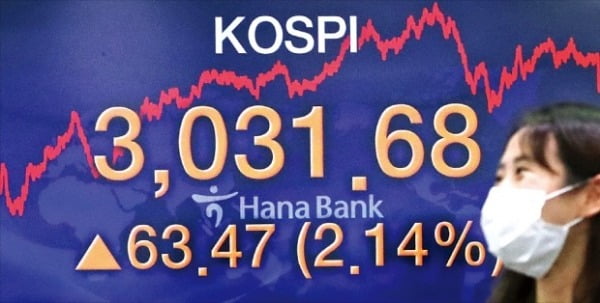Foreigners left Korea stock market last month
韓銀 “Foreigners, net selling for the purpose of realizing profit”
KOSPI increase rate, 2nd in major countries in the world

Photo = News 1
Foreign investment lost about $2.360 billion from the domestic capital market last month. The outflow was the largest since March last year, when the global financial market shook with Corona 19. They mostly pulled out money from stocks that are trending upward. As the KOSPI index continued to rise and crossed the 3000 line, it is noteworthy whether the movement of foreigners leaving Korea will continue in the future.
Foreigners who are taking profit
Looking at the’International Finance and Foreign Exchange Market Trends since December’ announced by the Bank of Korea on the 8th, in December last year, foreign investment in the domestic stock market amounted to a net outflow of $2.360 billion. This net outflow was the largest since March last year ($73.70 billion). By market, foreigners net sold stocks and bonds worth $2.19 billion and $170 million, respectively.
It has only been three months since September of last year that the stock market showed net selling. The amount of stocks sold was the highest since May last year ($3.27 billion). The increase in foreign net selling is a result of profit-taking.
From the end of November last year to the 6th of this month, the KOSPI index jumped 14.5%. During the same period, it showed the highest growth rate among major markets, excluding Turkey’s ISE100 (17.3%). Brazilian Bovespa (9.4%), UK FTSE100 (9.2%), India Sensex and Mexico Bolsa (9.1%), South African ALCH (8.3%), Indonesia IDX (8.1%), and so on. As the COVID-19 vaccination began in earnest, the sentiment of preference for risky assets spread, and it is evaluated that the stock market in emerging countries also showed an uptrend.
Even this month, foreigners are continuing to sell net sales. On the 1st to 7th of this month, they sold 41.5 billion won worth of net sales in the KOSPI market and sold 2492 contracts for futures.
Foreigners’ incentives to’trade arbitrage in government bonds’ increased, but
Foreigners are also stepping out of the domestic bond market. From September to December of last year, the net selling march continued for four consecutive months. However, the net selling amount is falling to $450 million in November and $170 million in December.
As the negative width of the swap rate (KRW procurement rate) increased, it was interpreted as a result of the incentive of foreigners’ government bond’arbitrage trade’. If the swap rate is negative, it means that the dollar is valuable, so foreigners can earn interest by converting the won into dollars. Conversely, if it is positive, you have to pay extra interest in the process of converting the won into dollars.
The average of the swap rate in November last year was 0.15% per year, but the average in December last year was -0.04% per year, and on the 6th of this month, -0.09% per year. This means that the foreign exchange gains that foreigners can obtain in the process of buying government bonds by converting dollars have also increased.
However, as concerns over the supply and demand of government bonds have strengthened this year and the outlook that the real economy will rebound, the attractiveness of long-term bond investment is falling.
Meanwhile, expanding the point of view to 2020 alone, foreigners net bought bonds and stocks of $3.47 billion in the domestic capital market. This net purchase was the lowest in 4 years after 2016 ($2.17 billion). This is due to the weakened preference for risky assets due to the corona 19 pandemic in the first half of last year. Foreigners net sold stocks of $18.24 billion last year, while bonds net bought $21.7 billion.
Reporter Kim Ik-hwan [email protected]
